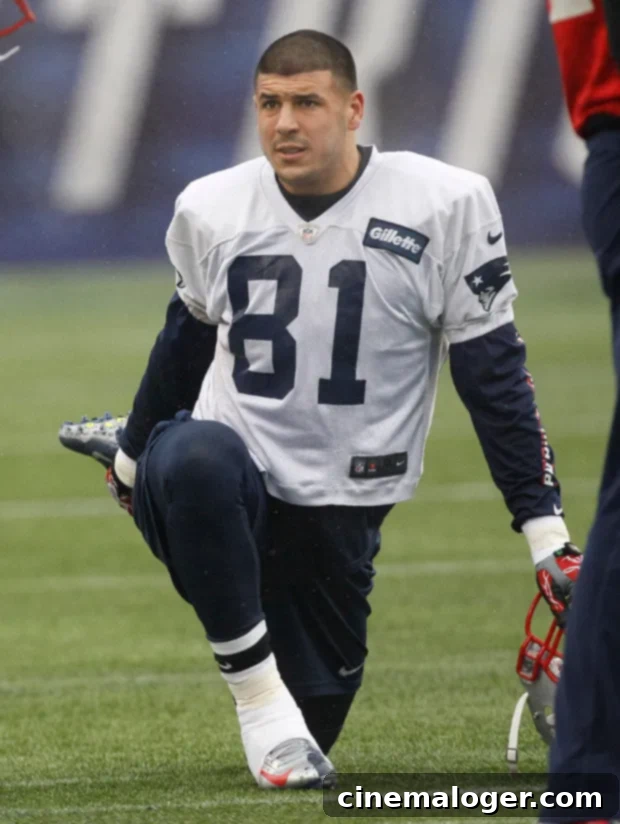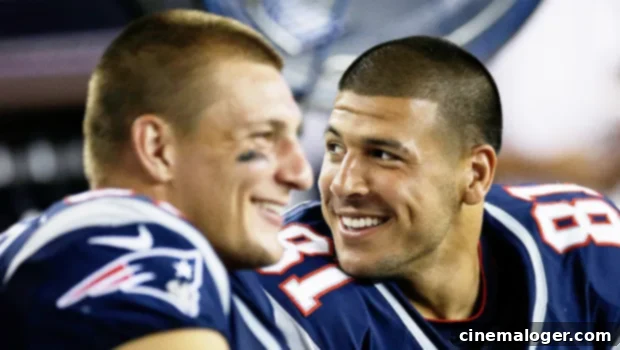Rob Gronkowski Reflects on Aaron Hernandez: Shock, Tragedy, and a Lingering NFL Enigma
Six years after the shocking conviction of Aaron Hernandez for the murder of Odin Lloyd, and four years following his tragic suicide in a jail cell, his former New England Patriots teammate, Rob Gronkowski, has finally addressed the deeply unsettling saga. Gronkowski’s recent comments offer a rare glimpse into the perspective of someone who shared the field and the locker room with Hernandez during what seemed to be the peak of his promising NFL career, before his life spiraled into a catastrophic downfall.
Speaking candidly during the March 17 episode of the 10 Questions with Kyle Brandt podcast, Rob Gronkowski, now 31, articulated the profound shock and disbelief that resonated through the sports world, and particularly within the Patriots organization, upon learning of the charges and subsequent conviction. “Aaron was a great player. He was a great football player,” Gronkowski stated, beginning with an acknowledgment of Hernandez’s undeniable talent. He continued, expressing the difficulty of reconciling the player he knew with the criminal he became: “But, I mean, I get questions like that all the time about him and everything. And with everything going on, I was definitely shook when I heard that, when I heard everything about it.”
Gronkowski elaborated on the inherent trust and camaraderie within a team, and how such events shatter that perception. “Because being his teammate and everything and you just, you really don’t see that. You’re not really looking into players like ‘that’s who they are’ or ‘that’s what they’re doing,’” he explained. This sentiment captures the bewilderment many experienced, struggling to understand how a high-profile athlete, seemingly at the top of his game, could be involved in such heinous acts. Hernandez’s arrest in 2013 for the murder of Odin Lloyd sent shockwaves through the NFL. He was ultimately convicted of first-degree murder two years later, a verdict that sealed his fate to life in prison without parole. The legal troubles didn’t end there; Aaron was subsequently indicted for the deaths of Daniel de Abreu and Safiro Furtado but was acquitted of those charges in 2017. Tragically, shortly after that acquittal, he took his own life in his jail cell. Gronkowski concluded his thoughts on the matter, trying to find a simple summation for such a complex tragedy: “I just try to keep it simple and light. He was a great football player but that does not mean anything. You learn from other people, too.”

The intertwined careers of Aaron Hernandez and Rob Gronkowski began in 2010 when both were drafted by the New England Patriots. They quickly formed a formidable duo, becoming one of the most dynamic tight end tandems in NFL history, celebrated for their exceptional athleticism and synergy on the field. Their collective talent contributed significantly to the Patriots’ offensive power, making them a nightmare for opposing defenses. However, their shared journey abruptly ended in June 2013 when the Patriots released Aaron Hernandez immediately after he was charged with the first-degree murder of Odin Lloyd. Lloyd was dating Shaneah Jenkins, the sister of Hernandez’s then-fiancée, Shayanna Jenkins, adding another layer of personal connection and betrayal to the already chilling crime. The killing itself appeared to lack any clear, rational motive, leaving investigators and the public bewildered, especially as Aaron Hernandez adamantly maintained his innocence throughout the legal proceedings. Despite his claims, the jury in 2015 found him guilty of first-degree murder, resulting in a sentence of life in prison without the possibility of parole, effectively ending his freedom and football career.
The tragic and perplexing story of Aaron Hernandez became the focus of the critically acclaimed 2020 Netflix docuseries, Killer Inside: The Mind of Aaron Hernandez. This extensive series delved deep into the events surrounding the Odin Lloyd murder, the subsequent charges, and the devastating aftermath that unfolded. Beyond the crime itself, the documentary meticulously explored Hernandez’s life leading up to his NFL career, attempting to piece together the complex factors that might have contributed to his eventual downfall. It meticulously examined his upbringing, his early struggles, and the pressures of professional sports, all while exploring the darker aspects of his personal life, including his rumored bisexuality. The series brought to light many aspects of Hernandez’s life that were previously hidden from public view, inviting viewers to ponder the intricate interplay of fame, identity, mental health, and violence.

One of the most poignant revelations from the documentary came from Hernandez’s fiancée, Shayanna Jenkins. She shared her emotional struggle with the rumors surrounding his bisexuality, admitting her lack of awareness during their relationship. “If he did feel that way, or if he felt the urge, I wish that I was told,” she confessed through tears in the documentary. “I wish he would have told me because I would not have loved him any differently. I would have understood. [Bisexuality is] not shameful, and I don’t think anybody should feel shameful on who they are inside, regardless of who they love. I think it’s a beautiful thing. I just wish I was able to tell him that.” Her heartfelt statement highlighted the tragic burden Hernandez might have carried, suggesting that societal pressures and the intense scrutiny of professional sports might have prevented him from openly expressing his true identity, possibly contributing to his internal turmoil.
Beyond the personal struggles and criminal acts, the Aaron Hernandez case also ignited significant discussions about player safety and the long-term neurological effects of playing contact sports. Posthumously, an examination of Hernandez’s brain revealed he suffered from severe chronic traumatic encephalopathy (CTE), a degenerative brain disease linked to repeated head trauma. This discovery was groundbreaking, as the stage of his CTE (Stage 3 out of 4) was unusually advanced for someone his age, prompting many to question the direct correlation between his brain condition and his erratic, violent behavior. The presence of CTE became a crucial element in understanding “The Mind of Aaron Hernandez,” offering a potential physiological explanation for his aggression, paranoia, and poor impulse control, although it certainly doesn’t excuse his actions. This finding brought the NFL’s ongoing struggles with player health and brain injuries to the forefront once again, fueling debates about safety protocols, concussion awareness, and the responsibilities of the league to its athletes.
The revelations about Hernandez’s CTE further complicated the public’s perception of his guilt and his legacy. While the legal system held him accountable for his crimes, the medical findings introduced a layer of tragic nuance, suggesting that his decisions may have been influenced by irreversible brain damage. This aspect of his story profoundly impacted how former teammates, including Rob Gronkowski, and the wider NFL community grappled with his downfall. It shifted the conversation from purely criminal intent to also considering the devastating toll that years of high-impact football can take on a player’s mental and emotional well-being. The Hernandez case, therefore, serves as a stark reminder of the complex interplay between athletic prowess, personal struggles, societal expectations, and the very real physical consequences that can arise from a career in professional sports, forcing a re-evaluation of how players are supported both during and after their time on the field.
Rob Gronkowski’s decision to finally speak out about Aaron Hernandez underscores the enduring impact of this tragic chapter on those who knew him. His words resonate with a mix of sorrow for a lost teammate and bewilderment at the inexplicable turn of events. Gronkowski’s perspective is a testament to the fact that even years later, the questions surrounding Aaron Hernandez—his immense talent, his shocking crimes, his personal demons, and the revelations of his brain disease—continue to echo. The legacy of Aaron Hernandez remains a somber and complex narrative within the NFL, a cautionary tale that has prompted significant introspection within the league and among fans about mental health, the pressures of fame, and the profound effects of head injuries on athletes’ lives. His story continues to be a point of discussion, prompting conversations that extend far beyond the football field, touching on themes of morality, human frailty, and the search for understanding in the face of unspeakable tragedy.
Ultimately, Gronkowski’s simple yet profound statement—”He was a great football player but that does not mean anything. You learn from other people, too”—encapsulates the bittersweet lesson of Aaron Hernandez’s life. It highlights the stark separation between athletic achievement and personal conduct, and the necessity of learning from the most difficult and painful experiences. The tragedy of Aaron Hernandez continues to be a poignant and relevant topic, urging a deeper understanding of the individuals behind the helmets and the complex forces that shape their destinies, reminding us that even the brightest stars can harbor the darkest secrets and face the most profound internal battles.
